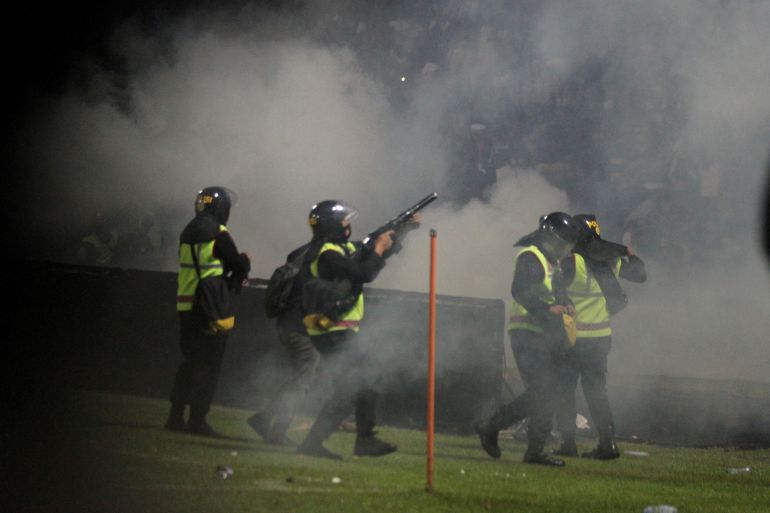Indonesian football officials jailed over deadly stadium crush
Two football officials have been jailed after being found guilty of negligence in the case of 135 spectators killed in the 2022 stadium crush.

A court in Indonesia has sentenced two match officials to jail after finding them guilty of negligence over a crush in a football stadium that left 135 people dead, in one of the world’s worst sporting disasters.
The crush took place in October 2022 when a tense match in Malang, East Java, between bitter rivals Arema FC and Persebaya Surabaya ended in chaos, with a pitch invasion and police firing volleys of tear gas. Amid the suffocating smoke, people rushed for the exits only to find some of them locked resulting in a deadly crush.
Keep reading
list of 4 items125 killed in stampede, riot at Indonesia football match
Deadly Indonesia football stampede caused by tear gas: Minister
Police tear gas main cause of Indonesia football tragedy: Report
A judge at the court in Surabaya, some 780km (484 miles) east of the capital, Jakarta, found match organiser Abdul Haris guilty on Thursday of “negligence causing people to die”.
“I am sentencing the defendant to a year and a half in prison,” presiding judge Abu Achmad Sidqi Amsya said.
The court also found a stadium security official, Suko Sutrisno, guilty of negligence and sentenced him to one year in prison.
Prosecutors had sought a sentence of six years for both men.
“The defendant did not anticipate the chaos because there has never been an emergency situation before. The defendant also did not understand his job as a security official well,” the judge said.
Both men have seven days to appeal the verdict.
The court will announce the verdicts against the three police officers – who were also charged with offences following the disaster at the Kanjuruhan Stadium – at a later date.
The legal team for match official Abdul Haris did not immediately respond to a request for comment.
Al Jazeera’s Jessica Washington, reporting from Jakarta, said the court proceedings focused on the officials responsible for the ill-fated match.
“What we heard from the prosecution is that the organising committee, the match officials, well they had a responsibility to ensure that spectators were safe, that the stadium gates were unlocked, that evacuation routes were clear,” Washington said.
“The response that we heard from the defence was that, even though, yes, capacity may have been an issue – more than 43,000 tickets were sold for this match – in previous matches, the same amount of people had attended matches at that stadium … and there had been no safety incidents,” she said.
The defence also “pointed the finger at police, putting the blame very much on police who fired the tear gas”, Washington added.
Video footage from the night of the tragedy showed police firing tear gas not only at fans who had invaded the pitch but also at those who were still in the stands.

“That resulted in people panicking and running for the gates only to find that many of the gates were closed, were locked, and they could not escape from the tear gas-filled stadium,” Washington said.
Investigators from Indonesia’s human rights body also placed most of the blame on the police for the “indiscriminate” and “excessive” use of tear gas on the night, she added.
That investigation found that police had fired 45 rounds of tear gas into crowds at the stadium, media reported.
Football’s world governing body FIFA has banned the use of tear gas as a crowd control measure inside stadiums.
Of the 135 people who died in the stadium that night, 38 were under the age of 17. The youngest was just three years old.
Indonesian President Joko Widodo said shortly after the disaster that his government would demolish and rebuild the stadium and announced the suspension of all competitive football games. League matches resumed last month, without any fans in the stands.
Five people in total were placed on trial following the stadium tragedy, including the three police officers.
Video shared on social media last month appeared to show Indonesian police officers attempting to disrupt that trial, jeering and heckling as prosecutors arrived at the court on February 14.
Indonesia’s Legal Aid Institute, in conjunction with several other civil society groups, said in a statement following the court incident that the police officers’ behaviour showed a clear abuse of power and was designed to disrupt the legal process.
Following the stadium disaster, the head of the Indonesian National Police, Listyo Sigit Prabowo, sacked Malang police chief Ferli Hidayat and relieved nine officers of their duties.